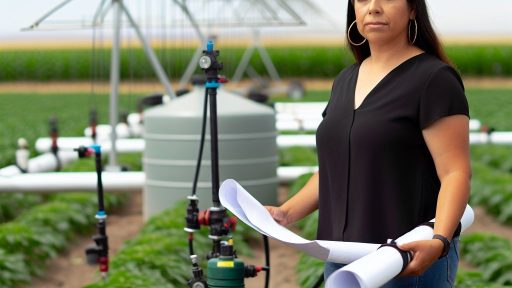Understanding Agritourism
Definition and Overview
Agritourism couples agriculture and tourism.
It allows visitors to experience farm life firsthand.
This concept offers various activities on working farms.
Such activities may include farm tours, workshops, and festivals.
Agritourism cultivates a connection between consumers and food sources.
Benefits of Agritourism
Agritourism diversifies farm income streams.
It provides farmers with additional revenue beyond traditional crops.
Moreover, it can help reduce the financial risks associated with farming.
Farmers can earn income during off-seasons.
Positive Impact on Local Communities
Agritourism can boost local economies.
It encourages visitors to shop at local businesses.
Additionally, it promotes community pride in agricultural heritage.
Visitors learn about farming practices and sustainability.
Promoting Environmental Awareness
Agritourism fosters a greater appreciation for the environment.
It highlights the importance of sustainable practices.
Transform Your Agribusiness
Unlock your farm's potential with expert advice tailored to your needs. Get actionable steps that drive real results.
Get StartedVisitors often engage in eco-friendly activities on farms.
This helps spread awareness about agricultural challenges.
Assessing Farm Readiness for Agritourism Initiatives
Evaluating Current Farm Operations
Begin by reviewing your existing farm operations.
Identify the strengths that can attract visitors.
Next, assess any weaknesses that may hinder operations.
Consider the types of activities you currently offer.
Analyze market demand for these activities.
Understanding Your Audience
Define your target audience for agritourism.
Conduct surveys to gather insights about potential visitors.
Note their interests and preferences regarding farm experiences.
Additionally, research demographic trends in agritourism.
Implement strategies to engage this audience effectively.
Infrastructure and Amenities
Evaluate your farm’s infrastructure for visitor access.
Inspect roads, parking areas, and facilities for comfort.
Ensure you have adequate restrooms and seating arrangements.
Consider adding tents or shelters for outdoor events.
Invest in signage that clearly directs visitors throughout your farm.
Legal Considerations and Permits
Research any local regulations regarding agritourism.
Consult with legal experts to clarify requirements.
Ensure compliance with health and safety standards.
Apply for necessary permits and licenses before launching.
Staffing and Training
Identify staffing needs for your agritourism initiatives.
Consider hiring seasonal staff for busy periods.
Provide training to ensure excellent visitor experiences.
Showcase Your Farming Business
Publish your professional farming services profile on our blog for a one-time fee of $200 and reach a dedicated audience of farmers and agribusiness owners.
Publish Your ProfileFoster a friendly and informative atmosphere among staff.
Marketing Strategies
Develop a comprehensive marketing plan for agritourism.
Utilize social media to promote events and activities.
Create partnerships with local businesses for cross-promotion.
Attending community events can boost visibility.
Leverage your website to attract online visitors.
Identifying Target Markets for Agritourism Experiences
Understanding Your Audience
Knowing your audience is crucial for successful agritourism.
Identifying the right demographics can enhance your marketing efforts.
Consider families, school groups, and corporate clients.
Each group has distinct needs and preferences.
Families with Children
Families seek fun and educational experiences.
They appreciate activities that engage children.
Offering farm tours and animal interactions is appealing.
Additionally, hosting seasonal events attracts family visitors.
School Groups
School trips focus on educational value.
Collaborate with local schools to tailor programs.
Field trips can include hands-on learning experiences.
Prepare materials that align with educational standards.
Corporate Clients
Businesses often look for team-building activities.
Agritourism can offer unique off-site retreats.
Plan workshops and skill-building events on the farm.
Highlight benefits like relaxation and productivity boosts.
Tourists and Travelers
Targeting general tourists can expand your reach.
Promote your agritourism offerings through travel agencies.
Showcase your location’s distinct features or attractions.
Social media campaigns can attract varied audiences.
Identifying Niche Markets
Explore niche segments for specialized experiences.
Consider offering farm-to-table dining options.
Farm-based wellness retreats can attract health-conscious consumers.
Unique activities like workshops on cheese-making are appealing.
Market Research Techniques
Utilize surveys and feedback forms to gather insights.
Engage with customers through social media platforms.
Analyze industry trends and competitors in your area.
Regularly adjust your offerings based on market feedback.
Explore Further: Building Resilient Supply Chains for the Farming Industry
Designing Unique Agritourism Offerings
Creating Engaging Tours
Creating engaging tours attracts visitors to your farm.
Start with a well-planned route that showcases your farm’s attractions.
Include activities like animal feeding and crop picking.
Highlight the unique aspects of your farm, such as heritage breeds.
Furthermore, consider offering themed tours for special occasions.
Showcase Your Farming Business
Publish your professional farming services profile on our blog for a one-time fee of $200 and reach a dedicated audience of farmers and agribusiness owners.
Publish Your ProfileIncorporating storytelling can enhance the visitor experience.
Collaborate with local historians to provide insights into your area.
Hosting Educational Workshops
Educational workshops provide valuable experiences for attendees.
Offer sessions on topics like organic gardening or cheese-making.
Invite local experts to lead these workshops for authenticity.
Promote hands-on activities that encourage active participation.
Additionally, ensure these workshops cater to all age groups.
Consider providing resources for participants to take home.
Using social media can help spread the word about upcoming workshops.
Organizing Seasonal Events
Seasonal events create excitement and boost visitor numbers.
Plan activities around harvest festivals or holiday celebrations.
Consider pumpkin picking in autumn or lavender harvesting in summer.
Games, contests, and live music can enhance the festive atmosphere.
Partnering with local vendors can diversify offerings at events.
Remember to promote these events through community channels.
This approach not only increases visibility but builds a loyal customer base.
Uncover the Details: Integrating Supply Chain Optimization into Farm Operations
Marketing Strategies for Agritourism: Leveraging Social Media and Local Partnerships
Importance of Social Media
Social media platforms are essential for promoting agritourism.
They provide farmers with a direct line to potential visitors.
Creative content can capture the beauty of the farm.
This content can include photos and videos of farm activities.
Engaging posts encourage interaction and shares.
Building a Strong Online Presence
Establishing a well-designed website is crucial.
The site should highlight available attractions and events.
Additionally, include an easy online booking system.
Regular updates keep the content fresh and relevant.
Consider starting a blog to share farming insights.
Cultivating Local Partnerships
Collaborating with local businesses enhances visibility.
Form partnerships with restaurants to feature farm products.
Local hotels can offer package deals for visitors.
Community events can showcase agritourism opportunities.
Working with tourism boards can attract wider audiences.
Utilizing Influencers and Local Media
Partnering with influencers can expand reach significantly.
Influencers can share authentic experiences with their followers.
Reaching out to local media can garner attention.
Press releases can highlight upcoming events and activities.
Invite journalists to experience vital farm events firsthand.
Engaging with the Community
Holding community days helps to foster relationships.
These events can engage locals in agritourism activities.
Feedback from the community can guide improvements.
Showcase Your Farming Business
Publish your professional farming services profile on our blog for a one-time fee of $200 and reach a dedicated audience of farmers and agribusiness owners.
Publish Your ProfileCommunity support can lead to stronger visitor attendance.
Tracking and Analyzing Success
Regularly review social media analytics for improvement.
This data helps to identify what works best.
Adjust marketing strategies based on performance insights.
Continual evaluation ensures an effective agritourism approach.
Explore Further: Renewable Energy Solutions In Sustainable Farming

Regulatory Considerations
Zoning Laws
Understanding local zoning laws is crucial for agritourism.
These laws dictate how land can be used for recreational activities.
First, check if your farm is zoned for commercial activities.
Local authorities may require special permits for agritourism.
Always consult with a land-use attorney if you’re unsure.
Moreover, some areas have specific requirements for visitor facilities.
You may need to provide restrooms, parking, or signage.
Engaging with local planning boards can smoothen the process.
Insurance Requirements
Implementing agritourism also demands careful attention to insurance.
Regular farm insurance may not cover visitor-related incidents.
Seek liability insurance tailored for agritourism activities.
This can protect against accidents or injuries on site.
Additionally, consider coverage for property damage related to visitors.
Some policies extend to equipment used for tours and events.
Consulting an insurance agent can help identify necessary coverage.
Maintaining comprehensive insurance ensures peace of mind.
Find Out More: Enhancing Crop Protection Through Innovative Strategies
Case Studies: Successful Agritourism Models from Around the World
Farm Stay Experience in Tuscany
Tuscan farms attract visitors with picturesque landscapes and rich history.
The agritourism model combines lodging with wine and olive oil production.
Guests enjoy farm activities like grape picking and cooking classes.
This immersive experience builds a strong connection to agricultural practices.
Farmers like Luca Benedetti have successfully increased their income through these offerings.
Picking Fruit in the U.S. Midwest
Fruit orchards in states like Michigan and Wisconsin have grown popular.
Many orchards invite families to pick their own apples and berries.
This hands-on experience creates lasting memories for visitors.
Farmers diversify income by offering seasonal events and festivals.
For instance, Hillside Orchard in Michigan reports significant revenue boosts during harvest seasons.
Wine Tours in South Africa
South Africa’s wine regions offer extensive agritourism opportunities.
Visitors participate in tastings, vineyard tours, and food pairings.
This model promotes local culture and boosts the economy.
Farms, such as Groot Constantia, have established global recognition.
Consequently, wine tourism significantly contributes to the region’s income.
Eco-Tourism in New Zealand
New Zealand operates on an eco-tourism model integrating sustainability with tourism.
Farmers invite tourists to engage with the land and learn about sustainable farming.
Showcase Your Farming Business
Publish your professional farming services profile on our blog for a one-time fee of $200 and reach a dedicated audience of farmers and agribusiness owners.
Publish Your ProfileVisitors help with daily tasks like milking cows or harvesting vegetables.
This interaction promotes conservation and appreciation for agricultural practices.
Examples include the Rimu Grove Farm, which emphasizes organic farming methods.
Farmers’ Markets in Canada
Farmers’ markets across Canada provide an excellent agritourism model.
They draw local residents and tourists alike to experience fresh produce.
Farmers build relationships with their customers through direct sales.
These markets also feature local artisans and entertainment options.
West Coast markets offer seasonal festivals that enhance the community’s appeal.
Evaluating the Financial Impact of Agritourism on Farm Income
Understanding Agritourism
Agritourism combines agriculture and tourism in a unique way.
This practice provides new income streams for farmers.
It allows visitors to experience farm life firsthand.
Engaging tourists can enhance the overall farm experience.
Identifying Revenue Sources
Agritourism can diversify revenue through various activities.
Farm tours are popular among visitors seeking knowledge.
Workshops on farming practices can attract groups.
Additionally, selling farm products on-site increases sales.
Special events, like harvest festivals, draw larger crowds.
Analyzing Costs and Investments
While agritourism offers many benefits, costs exist.
Initial investments in facilities may be necessary.
These facilities could include visitor centers and restrooms.
Marketing expenses also play a role in overall costs.
It is wise to create a budget for unexpected expenses.
Measuring Financial Success
Calculating the return on investment is crucial.
Farmers should track income generated by agritourism.
Comparing annual income before and after implementation helps.
Setting measurable goals can enhance financial assessment.
Ultimately, evaluating guest feedback will aid improvements.
Exploring Case Studies
Several farms successfully implemented agritourism practices.
The Johnson Family Farm saw a 40% revenue increase.
The Smith Orchard attracted over 5,000 visitors last year.
These examples highlight the viability of diversified income.
Analyzing their strategies can offer beneficial insights.
Additional Resources
Agritourism and On-Farm Direct Sales Interviews: Report of …
Economic Sustainability and Multiple Risk Management Strategies …




